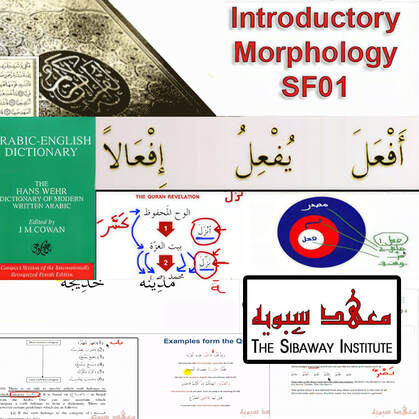SF01: INTRODUCTORY MORPHOLOGY

Morphology (صرف ) is the study of the structure of words, enabling you identify root letters and patterns. By the end of the course one will develop an in-depth understanding of verb and noun structures and how to derive words from a 3 letter root. Many examples will be used from the Quran to allow one to taste some of its linguistic beauty.
We have Qualified teachers to answer all your questions. The course material is easy to understand and one will receive relevant handouts and assignments to reinforce the knowledge taught in the lessons. The course is based on a number of classical Morphology texts.
Students can enrol in this course and get access to the course material and be able to download it for future reference. The student will also have access to online teachers as well as extra lessons when they become available.
Course Overview
Module 1: An Introduction to the Science of Morphology: base letters and examples of how words are derived, advice on how to study sarf, introduction to the verb (person, gender, number), conjugation tables are introduced with the 14 verb forms, transitive and intransitive verbs, active and passive verbs, Arabic Terminology required. [47:24 minutes]
Module 2 : Past tense verbs: Introduction to the passive voice, negation of verbs, near past tense, distant past tense. A detailed discussions regarding the subject of the verb. An introduction to the present tense verb. Using the Hans Wehr Dictionary to look up verbs. [34:44 minutes]
Module 3 : Present tense verbs: The 3 main meanings for the present tense verb, The structure of the present tense verb and how to construct them from the past tense verbs. A detailed discussions regarding the subject of the present tense verb.Introduction to the particles of negation and future that are associated with the present tense verb. Examining verbs in Surat Al Burooj ( Surah 85). [47:20 minutes]
Module 4 : Categories of Triliteral verbs, Command verbs: The 6 categories of triliteral verb. How to increase your vocabulary, The command verbs: how they are constructed, the lam of command, examples of command verbs in the Quran. [49:52 minutes]
Module 5 : Derived and non-derived nouns, active and passive participle: The verbal noun, derived and non derived nouns. The main types of derived nouns. Construction of the active and passive participles. linguistic discussions on verbs and nouns. Patterns of verbs and nouns and their associated meanings. [51:22 minutes]
Module 6 : The Masdar (verbal noun) and linguistic aspects of the verb: Which word is the masdar? The Basra and Kufan school. detailed discussion on the masdar including examples from the Quran. Linguistic usages of the different verb types. [36:08 minutes]
Module 7 : Introduction to unsound and weak verbs, the double consonant verb explained: Terminology related to the sound, unsound and weak verbs. A detailed examination of the double consonant verb ( Conjugations of the past,present and command verbs). [41:56 minutes]
Module 8 : The verb that contains a Hamza explained: A detailed examination of the verb that contains the Hamza ( Conjugations of the past,present and command verbs). Rules related to the lightning of the Hamza. Exceptions related to this verb type. [19:15 minutes]
We have Qualified teachers to answer all your questions. The course material is easy to understand and one will receive relevant handouts and assignments to reinforce the knowledge taught in the lessons. The course is based on a number of classical Morphology texts.
Students can enrol in this course and get access to the course material and be able to download it for future reference. The student will also have access to online teachers as well as extra lessons when they become available.
Course Overview
Module 1: An Introduction to the Science of Morphology: base letters and examples of how words are derived, advice on how to study sarf, introduction to the verb (person, gender, number), conjugation tables are introduced with the 14 verb forms, transitive and intransitive verbs, active and passive verbs, Arabic Terminology required. [47:24 minutes]
Module 2 : Past tense verbs: Introduction to the passive voice, negation of verbs, near past tense, distant past tense. A detailed discussions regarding the subject of the verb. An introduction to the present tense verb. Using the Hans Wehr Dictionary to look up verbs. [34:44 minutes]
Module 3 : Present tense verbs: The 3 main meanings for the present tense verb, The structure of the present tense verb and how to construct them from the past tense verbs. A detailed discussions regarding the subject of the present tense verb.Introduction to the particles of negation and future that are associated with the present tense verb. Examining verbs in Surat Al Burooj ( Surah 85). [47:20 minutes]
Module 4 : Categories of Triliteral verbs, Command verbs: The 6 categories of triliteral verb. How to increase your vocabulary, The command verbs: how they are constructed, the lam of command, examples of command verbs in the Quran. [49:52 minutes]
Module 5 : Derived and non-derived nouns, active and passive participle: The verbal noun, derived and non derived nouns. The main types of derived nouns. Construction of the active and passive participles. linguistic discussions on verbs and nouns. Patterns of verbs and nouns and their associated meanings. [51:22 minutes]
Module 6 : The Masdar (verbal noun) and linguistic aspects of the verb: Which word is the masdar? The Basra and Kufan school. detailed discussion on the masdar including examples from the Quran. Linguistic usages of the different verb types. [36:08 minutes]
Module 7 : Introduction to unsound and weak verbs, the double consonant verb explained: Terminology related to the sound, unsound and weak verbs. A detailed examination of the double consonant verb ( Conjugations of the past,present and command verbs). [41:56 minutes]
Module 8 : The verb that contains a Hamza explained: A detailed examination of the verb that contains the Hamza ( Conjugations of the past,present and command verbs). Rules related to the lightning of the Hamza. Exceptions related to this verb type. [19:15 minutes]
2 payment options
YOU CAN PAY SECURELY THROUGH STRIPE OR PAYPAL
WE ALSO OFFER FULL UNRESTRICTED LIFETIME access to our complete library of courses and resources without any time restrictions. This option is ideal for anyone who wants to dedicate their life to studying the Quran and Arabic. New lessons and courses are available on a regular basis.
What price would you pay to experience the Linguistic Miracle of the Quran???
What price would you pay to experience the Linguistic Miracle of the Quran???

This will give you FULL UNRESTRICTED LIFETIME access to all our courses and invaluable resources, designed for those who are devoted to mastering the Quran and Arabic sciences. This unparalleled opportunity is perfect for those who are committed to immersing themselves in the study and are eager to explore the depths of Quranic Arabic.
You can study any course at your own pace and we will have new lessons and courses introduced regularly, ensuring your educational journey remains constant and engaging.
What price would you pay to experience the Linguistic Miracle of the Quran???
You can study any course at your own pace and we will have new lessons and courses introduced regularly, ensuring your educational journey remains constant and engaging.
What price would you pay to experience the Linguistic Miracle of the Quran???



